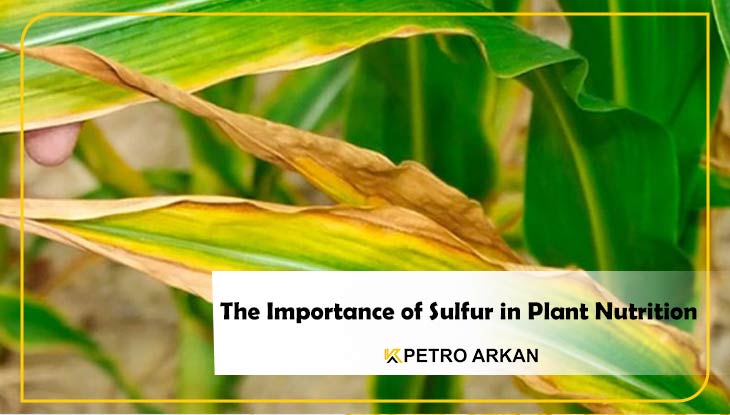The significance of sulfur in plant growth is fundamental to achieving robust crops and sustainable farming practices. As a critical nutrient, sulfur supports the formation of proteins, enzymes, and vital compounds that enhance crop quality and soil health. This article, brought to you by PetroArkanCompany, explores the role of sulfur in plant growth, the impacts of its deficiency, and effective strategies to ensure its availability for optimal agricultural success.
Understanding Sulfur’s Role in Plants
Sulfur is a vital element for all living organisms, particularly plants, where it drives sulfur in plant growth by being absorbed as sulfate through roots and converted into amino acids like cysteine in leaves. Comprising about 1% of a plant’s dry weight, sulfur is integral to amino acids (methionine, cysteine), glutathione, chlorophyll, vitamins (biotin, thiamine), and coenzyme A. Sulfur in plant growth facilitates disulfide bond formation in proteins, regulates enzyme activity, and protects plants from oxidative stress, ensuring vigorous development.
Sulfur’s Impact on Plant Health and Deficiency
How Sulfur Boosts Crop Performance
The role of sulfur in plant growth includes supporting amino acid synthesis, essential for protein formation. Combined with nitrogen, sulfur in plant growth enhances crop vigor, stress tolerance, and nutrient efficiency. It aids chlorophyll production for photosynthesis and improves the flavor and nutritional quality of crops like onions, garlic, and mustard. Additionally, sulfur in plant growth promotes starch accumulation in tubers and boosts seed oil content, contributing to overall crop health.
Key Benefits of Sulfur for Crops
-
Enhances photosynthesis through chlorophyll synthesis.
-
Improves crop yield and produce quality.
-
Increases oil content in seeds and starch in tubers.
-
Facilitates nitrogen, phosphorus, and potassium (NPK) uptake.
-
Strengthens plants against environmental stresses.
-
Activates enzymes critical for biochemical processes.
Signs and Effects of Sulfur Deficiency
Sulfur deficiency disrupts plant nutrition and manifests through:
-
Chlorosis: Younger leaves turn yellow, starting at tips and edges.
-
Stunted Growth: Plants appear smaller and less vigorous.
-
Delayed Maturity: Flowering and fruiting are delayed, reducing reproductive success.
-
Nutrient Imbalance: Sulfur deficiency impairs nitrogen uptake, causing nutrient issues.
Insufficient sulfur in plant growth reduces yields, produces smaller fruits with lower sugar content, and shortens shelf life, increasing vulnerability to pests and diseases.
Effective Sulfur Fertilization Strategies
To ensure adequate sulfur in plant growth, PetroArkanCompany recommends supplying sulfur through fertilizers, manure, or organic matter decomposition. Plants absorb sulfur at a 10:1 ratio with nitrogen, storing it in tissues. To address sulfur deficiency, farmers can:
-
Conduct soil tests to assess sulfur levels.
-
Apply sulfate-based fertilizers (e.g., ammonium sulfate, potassium sulfate) for immediate availability.
-
Use elemental sulfur (90-99% purity), which requires microbial conversion to sulfate.
-
Enhance soil fertility through organic matter and pH management.
-
Implement crop rotation to maintain nutrient balance.
-
Use foliar sprays for rapid correction of severe deficiencies.
PetroArkanCompany offers high-quality, eco-friendly sulfur fertilizers to support crop health and nutrient uptake, particularly in sandy or overworked soils.
Why Sulfur Is Essential for Plant Nutrition
Comparable to phosphorus, sulfur’s role in plant growth supports enzyme formation and protein synthesis. Minor deficiencies can significantly reduce plant vitality. PetroArkanCompany provides reliable sulfur solutions to maintain soil fertility and promote robust crop development.
Conclusion
The role of sulfur in plant growth is critical for protein synthesis, chlorophyll production, and enzyme activation. Deficiency leads to reduced yields and poor produce quality. With soil testing, sulfur fertilization, and sustainable practices, farmers can optimize crop health. PetroArkanCompany is committed to providing eco-friendly fertilizers to ensure agricultural success and enhanced crop nutrition.
FAQ
1.Can sulfur be mixed with water for application?
Yes, sulfur can be mixed with water for foliar sprays or applied directly to soil for efficient uptake.
2.Is sulfur alkaline or acidic?
Sulfur is acidic, helping to lower soil pH in alkaline environments, improving nutrient availability.
3.What happens if plants receive too much sulfur?
Excess sulfur can damage roots, disrupt nutrient uptake, and reduce plant health.
4.How does sulfur deficiency affect crop quality?
Sulfur deficiency results in smaller fruits, lower sugar content, and reduced shelf life, impacting yield and marketability.
5.What are the best sulfur fertilizers for crops?
Sulfate-based fertilizers like ammonium sulfate offer immediate availability, while elemental sulfur provides a slower release after microbial conversion.








No comment